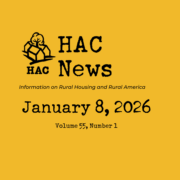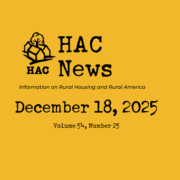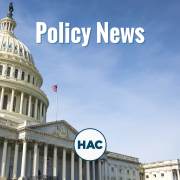HAC News: February 5, 2026
TOP STORIES
FY26 funding set for HUD and many others
After a partial government shutdown over the weekend, on February 3 the House passed a Senate-approved fiscal year 2026 appropriations bill covering several federal agencies, including HUD, and the president signed the measure into law. Many HUD programs remain at the dollar levels they received in FY24 and FY25, while a few receive increases. Details are posted on HAC’s site. FY26 funding for USDA, along with some other agencies, was finalized in November.
The bill also protects Continuum of Care operations while litigation continues regarding program changes HUD proposed. It directs HUD to provide one-year non-competitive renewals of CoC grants that expire in the first quarter of calendar year 2026 and then to continue the same process for each quarter in which it does not make new funding awards.
HAC launches Heirs’ Property Central site
HAC has developed a new website to act as a central clearinghouse for many professionals to access common resources related to heirs’ property. The site, Heirs’ Property Central, is a multidisciplinary hub for cross-sector collaboration, designed to facilitate new connections and discussions around past, present, and future heirs’ property work. Heirs’ Property Central highlights new research, events like trainings, webinars, and conferences, and organizations currently working in the heirs’ property space.
February is Black History Month
The 2026 theme is A Century of Black History Commemorations. President Trump’s proclamation is posted here.
RuralSTAT
The American Bar Association estimates that 40% of all U.S. counties and county-equivalents are legal deserts, areas with fewer than one attorney per 1,000 residents. Attorneys are needed for property owners to manage their assets, perform estate planning, and probate the estates of family members. In rural areas, lack of access to the legal system for estate planning can lead to the creation of heirs’ properties. Source: American Bar Association, Profile of the Legal Profession 2020.
To learn more about heirs’ property and title resolution for your community, visit Heirs’ Property Central.
OPPORTUNITIES
USDA to apply Strategic Economic and Community Development priority for some programs
A new notice from USDA Rural Development explains applications for the Strategic Economic and Community Development priority, which applies to Community Facilities Loans, Grants, and Guaranteed Loans; Water and Waste Disposal Program Guaranteed Loans, Loans, and Grants; Rural Business Development Grants; and Community Connect Grants. These programs will reserve FY26 funds for projects that support multi-jurisdictional and multi-sectoral strategic community investment plans, making them eligible for the SECD priority. An applicant will submit its SECD forms when it applies for funding under one of these programs.
ROSS Rapid Response Program grants offered
HUD’s ROSS Rapid Response Program uses a simplified application process to help address urgent social needs caused by unanticipated emergencies such as natural disasters, public health crises, or economic disruptions. RRP provides one-time cost-reimbursable grants for service coordination and limited direct services for residents of HUD-assisted housing. Nonprofits, PHAs, Tribes and their housing entities, resident associations, and owners of multifamily properties are eligible. Apply by January 25, 2027.
YouthBuild applications open
Nonprofits, state and local governments, and Tribes are eligible for YouthBuild grants from the Labor Department. YouthBuild programs must offer participants construction training and hands-on experiences building affordable housing for their community. Programs may also include a Construction Plus component, providing vocational training in additional high-demand industries. A recorded webinar for potential applicants will be posted online. Apply by March 2.
REGULATIONS AND FEDERAL AGENCIES
Green and Resilient Retrofit Program gets new guidelines
In 2024 and earlier, HUD announced award recipients in at least four rounds of its Green and Resilient Retrofit Program. The program was included in a lawsuit filed in March 2025 against several federal agencies for withholding funds appropriated by Congress. In April the judge issued a preliminary injunction ordering the agencies to proceed with the programs while the litigation continues. Responding to that order, HUD recently published a notice revising the terms of the awards previously announced. The differences include making awards that have not yet closed as loans rather than grants, eliminating solar energy as an allowable use of funds, establishing new timelines, and more. The notice also refers to “the former Green and Resilient Retrofit Program” and calls it simply “GRRP.”
HUD orders review of assisted tenants’ immigration status
HUD and the Department of Homeland Security announced they audited all tenants in HUD-funded housing nationwide, discovering that nearly 200,000 tenants require eligibility verification, nearly 25,000 were deceased, and nearly 6,000 are “ineligible non-American tenants.” Public housing authorities and owners have 30 days to verify the status of the tenants identified by the audit and initiate corrective action where it is needed.
FHFA deletes fair housing and equitable finance plans regulation
The Federal Housing Finance Agency finalized a proposal to delete its regulations requiring Fannie Mae, Freddie Mac, and the Federal Home Loan Banks to develop Fair Housing, Fair Lending, and Equitable Housing Finance plans every three years. FHFA argues that the statutorily required housing goals, Duty to Serve goals, and support for the Housing Trust Fund and Capital Magnet Fund meet the system’s public purpose to support access to credit in underserved markets.
FEMA Review Council extended
President Trump has issued an executive order extending the term of the FEMA Review Council, originally scheduled to end January 24. The council will now remain effective until March 25. After the cancellation of a December meeting at which council members had been expected to approve a final report recommending changes to the agency, the new EO in effect creates a deadline for council action.
VA audit finds gaps in follow-ups with homeless veterans
The Department of Veterans Affairs requires screening to identify veterans who are experiencing or at risk of homelessness and need assistance. Medical facilities must complete screenings for veterans under their care, have a process for positive screenings, and ensure staff respond to requests for services within seven business days. Follow-up action must occur within 30 days. VA conducted an audit and found weaknesses in the referral and follow-up processes that put veterans at risk of not receiving assistance after they indicated they were experiencing or at risk of homelessness.
HUD sets Operating Cost Adjustment Factors
New Operating Cost Adjustment Factors will be used to adjust project-based rental assistance for eligible multifamily housing projects having an anniversary date on or after February 11, 2026. HUD also requests comments by April 6 on the methodology and data sources used to determine the OCAFs.
Energy efficiency deadlines delayed again
In April 2024, HUD and USDA adopted updated energy efficiency requirements for new construction under some of their programs. These standards have gone into effect for HUD’s HOME and Housing Trust Fund programs, but both HUD and USDA delayed the effective dates for other programs. HUD has now announced a further delay. December 31, 2026 is the new compliance date for Federal Housing Administration-Insured Multifamily and Single Family loans, the Public Housing Capital Fund, and Section 8 Project Based Vouchers. The deadlines for Choice Neighborhoods, Section 202, and Section 811 are extended until their funding availability announcements for FY26 are published. HAC has supported adoption and implementation of these standards.
EVENTS
Learn how arts and civic engagement come together in rural places
The Department of Public Transformation is hosting an online Engage Rural Intro Session introducing its new arts-based civic engagement program for rural community leaders and artists. The session will highlight creative strategies that strengthen civic participation and trust within communities of 20,000 people or fewer, and explain how the revamped Engage Rural offerings can support local engagement work. Register for the February 25 session here.
PUBLICATIONS AND MEDIA
It’s cold out there! HAC publishes a research brief on home heating (and the lack of) in rural America
Home heating is a basic necessity with profound implications for health, finances, safety, and quality of life. Home heating dynamics and conditions, however, are not uniform across the country. Some rural communities and households face home heating challenges due to geography, infrastructure, and economic conditions. Read HAC’s new Rural Research Brief here.
Study reviews “State of the Dream 2026”
The Joint Center for Political and Economic Studies published State of the Dream 2026: From Regression to Signs of a Black Recession, which looks at the impacts on Black Americans of 2025’s housing policy, employment trends, tax policy, financial system, and more. It says the expansion of the Low-Income Housing Tax Credit, the permanent extension of the New Market Tax Credit, and the adoption of the HOME program’s final rule will help expand financing for affordable housing developments. It also notes that fair housing enforcement and affirmatively furthering fair housing efforts were rolled back, and Black homeownership remains at 45% compared to 74% for white households.
Maps of potential Opportunity Zones updated
American Community Survey five-year estimated data for 2020-2024, released by the Census Bureau in late January, will be used by the Treasury Department in determining what census tracts will be eligible for designation in the upcoming second round of the Opportunity Zones program. The Economic Innovation Group has updated its map of potentially eligible zones and Novogradac will update its map. Neither of these maps is official, but they illustrate possibilities. Governors will begin designating new OZs on July 1.
HAC
HAC issues statement about housing actions
In a January 26 statement, HAC applauds President Trump’s executive order barring institutional investors from purchasing single-family homes and supports the final appropriations bills passed in Congress to fund HUD and the CDFI Fund. While welcoming this progress, HAC also notes that “funds for several critical programs have yet to be distributed to applicants who are working daily to help low-income rural renters and homeowners. HAC looks forward to working with the Administration and the dedicated career employees at HUD, Treasury, and USDA, to ensure that this backlog, as well as newly appropriated fiscal 2026 funds, are brought to bear urgently on the housing challenges faced by rural Americans.”
HAC is hiring
HAC job listings and application links are available on our website.
Need capital for your affordable housing project?
HAC’s loan fund provides low interest rate loans to support single- and multifamily affordable housing projects for low-income rural residents throughout the U.S. and territories. Capital is available for all types of affordable and mixed-income housing projects, including preservation, new development, farmworker, senior and veteran housing. HAC loan funds can be used for pre-development, site acquisition, site development, construction/rehabilitation and permanent financing. Contact HAC’s loan fund staff at hacloanfund@ruralhome.org, 202-842-8600.
Please note: HAC is not able to offer loans to individuals or families. Borrowers must be nonprofit or for-profit organizations or government entities (including Tribes).
Want to reprint a HAC News item?
Please credit the HAC News and provide a link to HAC’s website. Thank you!

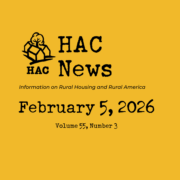


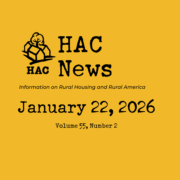
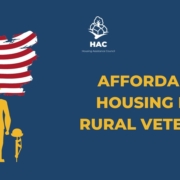 Housing Assistance Council
Housing Assistance Council